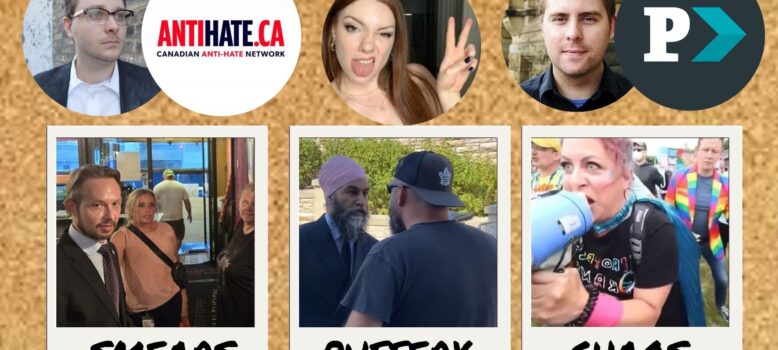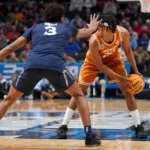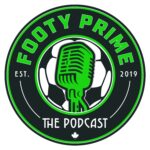

This week, I discussed two recent incidents of media spin involving MPs Michael Cooper and Jagmeet Singh on a popular Toronto radio show. Conservative MP Cooper was heavily criticized on social media for engaging amicably with Wellington Street Regulars, a loosely organized group of Ottawa residents known for consistently demonstrating since the Freedom Convoy. NDP MP Singh’s verbal confrontation with hecklers from the same protest circuit was framed as a bold response to hate, earning him praise for aggressively standing up to name-calling while flanked by security on Parliament Hill.
Meanwhile, Chris Dacey—one of the Wellington Street Regulars whose video journalism is often relied upon by national outlets—was among the protesters who spoke with Michael Cooper at the Red Pepper Thai-Viet restaurant. Dacey was not present for the Singh incident, but his interaction with Cooper was used to smear the MP, with headlines claiming Cooper was “egging on” extremists.
As it happens, left-wing extremists are targeting Dacey and journalists who use his footage. Dacey himself sustained physical injuries earlier this summer from black bloc protesters who stole his cellphone. The assault and robbery received no mainstream coverage and was not properly investigated by police. The rally where Dacey was attacked was organized by a publicly-funded group that received endorsements from forty elected officials, who then refused to condemn violence at political demonstrations and did not call on police to treat all protesters fairly and equally with no tolerance for intimidation.
🚨🚨🚨
My client Christopher Dacey was violently assaulted and robbed by masked assailants in Ottawa’s Confederation Park on May 17, 2024 at approximately 6 pm.
The attack appears premeditated and may constitute intimidation of a justice system participant.
Joe Morin (from… pic.twitter.com/nU7oIgBCpl
— Caryma Sa'd – Lawyer + Political Satirist (@CarymaRules) May 18, 2024
This lack of balanced scrutiny underscores a deeper problem in Canada. Smears and personal attacks are casually lobbed against opponents. The portrayal of the “far-right” (whatever that means) as the sole source of violence ignores aggression from the opposite side of the spectrum, with organizations like the Canadian Anti-Hate Network and PressProgress seemingly perpetuating one-sided narratives.
🚨NEW: It’s rare to see video evidence of the moment the “finding out” part begins.
But when Parliament Hill’s tinfoil-hatted perma-protesters decided to target Jagmeet Singh, the NDP leader decided enough was enough.
Here’s what happened — and what the NDP told me about it: pic.twitter.com/KnUmowUoM9
— Rachel Gilmore (@atRachelGilmore) September 18, 2024
Encouraging aggressive responses only feeds into a dangerous mentality—one embodied by the popular slogan “Punch Nazis.” However, anyone is liable to be labeled “Nazi” because the word has been stripped of meaning through constant misuse across the political spectrum. Our leaders have collectively opted to weaponize discourse to target dissent rather than promote intellectually rigorous conversations.
No Space for Hate (Sometimes)
MP Jagmeet Singh has been targeted by protesters for years. As a high-profile politician, he must be held to a higher standard, though one can sympathize with the pressure he faces. MP Singh’s decision to engage aggressively with a heckler—though earning fanfare and begrudging recognition from some right-wing personalities—raises important questions about how elected officials should handle confrontation. MP Singh made a conscious choice to turn around with security in tow and intimidate someone over harsh (but not necessarily hateful) words of criticism. As an image-conscious politician, he was surely aware the value this clip would have in bolstering his profile. Encouraging politicians to meet rudeness with aggression risks justifying vigilantism.
Its on everyone, its time we take a stand against bullies the same as we saw from @theJagmeetSingh yesterday…. say no to bullies and remember #BulliesBackDown when confronted.. hope to see many @NDP MPs attend of they can @CharlieAngusNDP @CPAC_TV @CanadianPress @_llebrun https://t.co/ihoSu4YJRw
— Clayton Goodwin #FeralHeathen (@7busboy7) September 18, 2024
At the same time, MP Michael Cooper’s willingness to engage with protesters like Chris Dacey was swiftly vilified. Selective framing from PressProgress editor Luke LeBrun twisted civil conversation into something far more nefarious. MP Cooper’s interaction was framed as dangerous and irresponsible, despite his mere act of democratic engagement. He was lambasted by several members of Parliament, including Liberal MP Pam Damoff and NDP MP Charlie Angus. MP Angus also took aim at protesters, implying they are foreign agents in cahoots with the Leader of the Official Opposition.
Putin's and Poilieivre's useful and toxic idiots. https://t.co/IwdyPy97Hl
— Charlie Angus (@CharlieAngusNDP) September 18, 2024
In response, another protester and independent journalist who spoke with MP Cooper said:
My response to the situation with MP Michael Cooper and the very harmful and frankly dangerous idea that Parliamentarians should be punished for listening to Canadians when out in public pic.twitter.com/J9g6KZdzHq
— Right Blend (@rightblend) September 18, 2024
Everyone has a responsibility to reverse the dangerous precedent where aggression is mistaken for legitimate political discourse. Politicians, like any citizen, should be able to exist in public spaces without being intimidated. Equally, no tranche of society should be cut off from participating in the democratic process.
Who Lubes Smear Pipelines?
There are well-oiled machines that fuel smear campaigns powered by influencers, government grants, media connections, and cozy relationships with radical activists. For instance, the Canadian Anti-Hate Network (CAHN), funded in large part with public money, effectively operates as a gatekeeper on discourse surrounding extremism. In an interview published October 2019 by Jewish Independent, Executive Director Evan Balgord laid out the organization’s first response to addressing anything he characterizes as “hate”:
Try to hold somebody socially accountable. That means, if the person is anonymous, exposing them. If the person is not anonymous, this might mean bringing their posts to the attention of their employers, family and friends… Those might provide checks on their behaviour… We’re not really trying to reform people here, we’re just trying to stop the spread of hate propaganda.
CAHN sets the narrative, attempting to portray anything remotely conservative as “far-right,” and therefore hateful. The modus operandi is to shame and ostracize.
On the flip side, bad actors on the “far-left” are given a pass. Deana Sherif is a prime example.
From Protest Darling to CAHNvite: The Case Study of Deana Sherif
Deana Sherif is a livestreamer within the far-left ecosystem. She is associated with Ottawa Activism, a Discord server that appropriated the City of Ottawa logo for its branding. This launched out of the Resistance Cats Discord, which is a subject for a future story. Sherif is known for targeting other citizens with verbal and physical abuse. Her violent actions tend to surpass anything attributed to the Wellington Street Regulars.
Sherif’s apparent relationship with NDP MPP Joel Harden complicates matters. MPP Harden himself has been caught in controversy after claiming he was punched at a protest—a claim that video footage later undermined. No mainstream outlet covered the actual violence of Sherif at that same rally, including dragging a woman by her hair, hitting a young man in the face with a megaphone, grabbing teenagers, and threatening to assault Muslim children.
Deana Sherif complained to Joel Harden that police did not shut down counter protesters, even though there was “enough violence.”
They commiserated over being assaulted, even though:
1) Deana gleefully instigated
2) Joel’s story was inconsistent📸 Jun 9, 2023 (Deana Sherif) pic.twitter.com/JfOGKZBSUY
— Caryma Sa'd – Lawyer + Political Satirist (@CarymaRules) December 31, 2023
Despite this, Sherif continues to escalate violence and evade media scrutiny. Her documented behaviour at protests, including instructing her minor daughter to use sound weapons against police, goes unreported.
I am representing Dacey in a peace bond application against Sherif because law enforcement has failed to maintain public order, allowing her to run roughshod over other citizens. Incidentally, she was not arrested until her violence allegedly targeted police. Ottawa Police refused to take new reports about Sherif’s ongoing hate-related activities while she was out on bail, with a Sergeant claiming she had already been “dealt with.” She was re-arrested a week after these attempted reports in another situation involving lashing out at police.
Deana Sherif’s violent actions at protests are well-documented, and yet, she remains largely unexamined by media outlets. If anything, she was portrayed in a positive light as representative of protesters for several movements, including anti-convoy, pro-drag storytime, Pride, and pro-Palestine.
The Canadian Anti-Hate Network (CAHN) encourages supporters to create a ruckus, including with whistles.
Here, Deana Sherif tells a protester “Go ahead!” with his @fox40whistle.
Is she giving permission or a command?
Things to think about as CAHN renews its call to use… pic.twitter.com/mkJX3mplpM
— Caryma Sa'd – Lawyer + Political Satirist (@CarymaRules) September 19, 2024
Sherif, who has physically assaulted protesters and armed her daughter with a sound device capable of causing permanent damage, is currently in jail. She was arrested at the start of the Labour Day weekend in front of her daughter for allegedly breaching bail conditions, disturbing the peace, and resisting arrest. But her long history of violence is ignored by the same media outlets that rush to label anyone on the right as racist and dangerous. The result is a lopsided portrayal of protest dynamics, and a lack of accountability for extremism.
Whose Streets? Our Streets! (But Not Your Streets)
The predominant narrative being spun is that violence and extremism comes only from the “far-right.” This is based on a simplistic view of protest dynamics and fails to account for the broader realities on the ground. The repetition of fearmongering without critical analysis reflects the partisanship of some media outlets, which can be not only misleading but also dangerous.
The Canadian Museum of History recently announced its acquisition of the “Battle of Billings Bridge” plaque. This unsanctioned plaque was an act of public vandalism and appropriated the City of Ottawa logo. It commemmorated the start of in-person mob vigilantism against the Freedom Convoy mob. Local residents frustrated with police inaction deputized themselves to block protesters from entering Ottawa, not unlike convoy participants who self-deputized on Coventry Road. Both sides choose monikers like “Freedom Fighters” and “the Resistance” to promote their respective movements. A common theme is disregard for rule of law. The plaque was affixed to Billings Bridge on the one-year anniversary, and celebrated by media and public figures, including MPP Joel Harden.
A small bronze plaque with a cheeky message was covertly installed to commemorate it in 2023. But no sooner had it arrived, it disappeared. Its creator has remained anonymous … until now.
(2/3) #Artifactuality
— Museum of History (@CanMusHistory) September 18, 2024
One can imagine the reaction to an unsanctioned city-branded plaque commemorating the Freedom Convoy.
My $0.02
Extremism, violence, and incivility are issues across the political spectrum. However, organizations like CAHN, PressProgress, and some media outlets focus almost exclusively on partisan smearing. They inflate the threat of far-right extremism while turning a blind eye to and potentially inciting bad actors on the far left. This double standard distorts public perception and contributes to polarization in Canada.
"Wannabe MAGA maple syrup Conservatives" 🤭 pic.twitter.com/UoUc3jiAwP
— Liberal Party (@liberal_party) September 18, 2024
The incidents involving MPs Singh and Cooper are just two examples in a broader campaign to control discourse and silence dissent. These smear pipelines, fueled by biased reporting, farmed outrage, cheerleading from politicians, and selective enforcement by police have real-world consequences. The fundamental problem is presupposing that some citizens are more worthy than others deemed second class. In reality, we are all neighbours and should be free to have our own thoughts and beliefs without facing mob harassment.
As someone who has been personally affected by such campaigns, I remain committed to exposing the false narratives that underlie this division. My approach is nonpartisan because all parties are complicit in allowing juvenile insults and personal attacks to dominate the landscape, escalating to criminal behaviour in some scenarios, including actual violence. As long as these tactics continue, democracy itself is at risk.
Correction: A previous version of this article said the incident involving Jagmeet Singh happened outside Parliament Hill, which has been corrected to on Parliament hill. The article has also been updated to reflect that Jonathan Villeneuve (Right Blend) is both a protester and independent journalist.
Caryma Sa'd
Caryma Sa'd takes a no holds barred approach in her razor-sharp commentary; nothing and nobody is immune from criticism.









